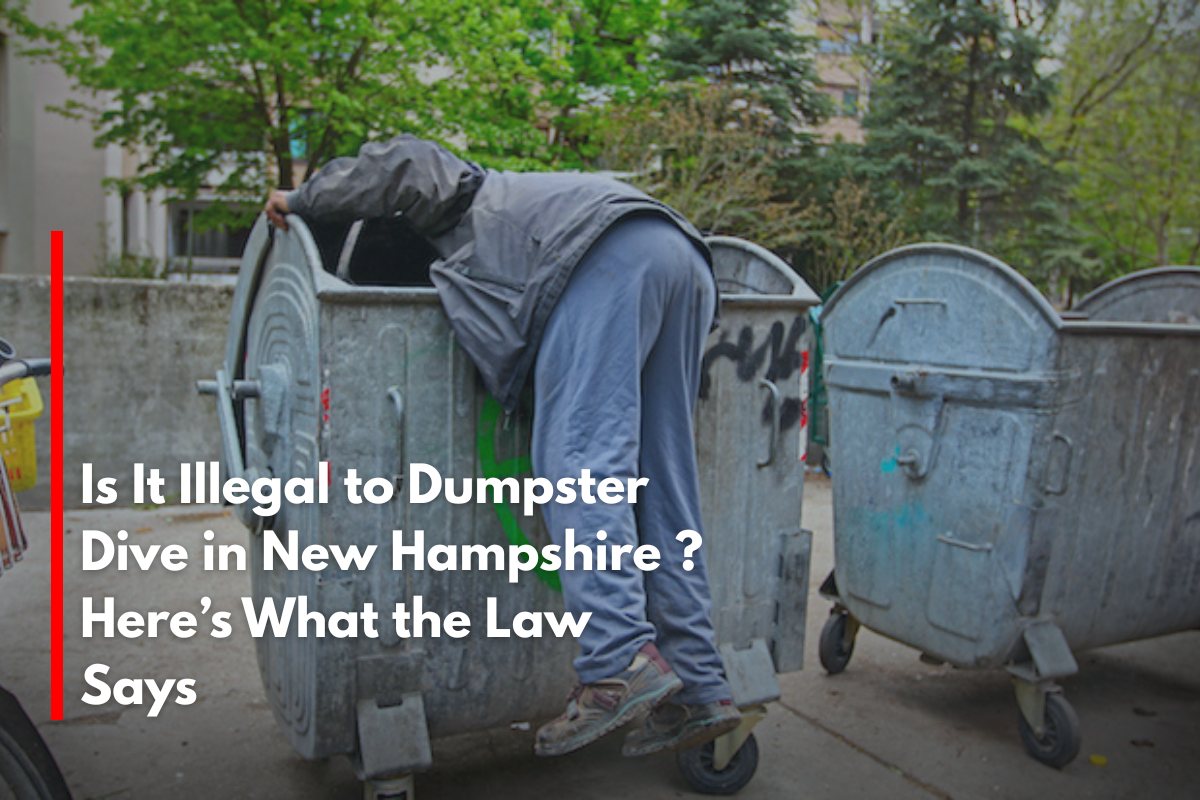Dumpster diving, the act of searching through trash bins or dumpsters to recover discarded but potentially useful items, is a practice that raises questions about legality and safety. In New Hampshire, dumpster diving is not outright illegal, but specific rules and restrictions apply that divers should be aware of to avoid legal trouble.
The Legal Status of Dumpster Diving in New Hampshire
In New Hampshire, there are no state laws explicitly prohibiting dumpster diving. The act itself is generally considered legal, especially when it involves bins and trash placed in public or accessible areas. This means that individuals are allowed to search through dumpsters for items without facing criminal charges solely for dumpster diving.
However, legality depends heavily on the context and location of the dumpster. While trash left in a public area, such as on the sidewalk or in an unlocked dumpster accessible to the public, may be scavenged without legal issues, diving into dumpsters located on private property can lead to problems.
Trespassing and Private Property Concerns
Many legal issues associated with dumpster diving arise from trespassing laws. In New Hampshire, dumpsters placed on private property—such as behind stores, businesses, or residences—are considered part of that property. Entering private property without permission to access these dumpsters can result in criminal trespassing charges.
Businesses and homeowners have the right to post “No Trespassing” signs, lock dumpsters, or secure their property to keep dumpster divers out. Ignoring such warnings or entering enclosed areas, fenced properties, or restricted zones could lead to fines or arrests.
What Does the U.S. Supreme Court Say?
A key federal precedent supporting dumpster diving comes from the 1988 U.S. Supreme Court case California v. Greenwood. The Court ruled that once trash is discarded and left in a public place for collection, it is no longer protected by privacy laws, and law enforcement may search it without a warrant. This ruling implies that discarded items in public dumpsters or trash bins can generally be accessed by anyone, supporting the legality of dumpster diving in public spaces.
Health and Safety Considerations
Although legal, dumpster diving carries health risks. Discarded food and other items may have spoiled, be contaminated, or pose hazards. New Hampshire does not have laws prohibiting the taking of food from dumpsters, but businesses are not liable for any illness resulting from consuming dumpster-found food. Divers should exercise caution and be aware of potential dangers related to hygiene and safety.
Local Ordinances and Regulations
While the state of New Hampshire permits dumpster diving in general, local municipal ordinances may have specific rules that restrict or regulate the practice. Some towns or cities could impose stricter trespassing or littering laws that impact dumpster divers. It is advisable for anyone interested in dumpster diving to check local codes before engaging in the activity.
Tips for Legal and Safe Dumpster Diving in New Hampshire
- Only dive in dumpsters located on publicly accessible property or where explicit permission has been granted.
- Avoid entering gated or fenced areas, especially if “No Trespassing” signs are posted.
- Do not damage property or create a mess while diving.
- Be mindful of health risks; avoid perishable or questionable food.
- Consider diving during daylight to reduce suspicion and for safety.
- Respect local laws and ask permission from business owners when possible.
Dumpster diving in New Hampshire is not illegal by itself, particularly when done in public spaces where trash has been discarded for collection. The main legal risk is trespassing on private property to access dumpsters, which can lead to charges or fines.
Divers should exercise caution, stay informed about local regulations, and respect property rights to ensure their dumpster diving activities remain lawful and safe.
By following these guidelines, dumpster diving in New Hampshire can be a legal and potentially rewarding way to reclaim discarded items, reduce waste, and support sustainable practices.
Sources
[1] https://wokq.com/dumpster-diving-legal-in-new-hampshire/
[2] https://wokq.com/dumpster-diving-new-hampshire-illegal/
[3] https://collincountymagazine.com/2025/07/09/is-it-illegal-to-dumpster-dive-in-new-hampshire-heres-what-the-law-says/
[4] https://www.reddit.com/r/DumpsterDiving/comments/8fraei/diving_in_nh/
[5] https://www.legalmatch.com/law-library/article/is-dumpster-diving-illegal.html











